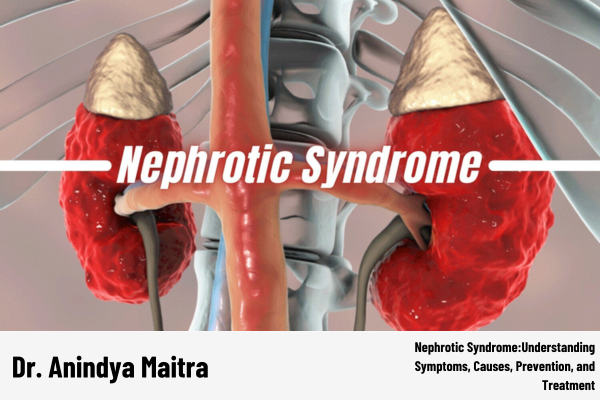Unveiling Nephrotic Syndrome: Insights by Dr. Anindya Maitra
Nephrotic syndrome, a kidney disorder characterized by the presence of protein in the urine, poses significant challenges for individuals and their families. Join Dr. Anindya Maitra, a distinguished nephrologist in Kolkata, as we delve into the complexities of nephrotic syndrome, understanding its symptoms, causes, prevention strategies, and treatment modalities for comprehensive management and support.
Understanding Nephrotic Syndrome: Symptoms and Diagnostic Criteria
Dr. Maitra elucidates that nephrotic syndrome is marked by a constellation of symptoms, including proteinuria (excess protein in urine), hypoalbuminemia (low levels of albumin in the blood), edema (swelling), and hyperlipidemia (high levels of lipids in the blood). Accurate diagnosis involves clinical evaluation, urine tests, blood tests, and kidney biopsy to determine the underlying cause and severity of the condition.
Exploring Causes and Risk Factors
While nephrotic syndrome can arise from various underlying conditions, Dr. Maitra discusses common causes such as minimal change disease, membranous nephropathy, focal segmental glomerulosclerosis, and systemic diseases like diabetes and lupus. Understanding risk factors such as genetics, infections, medications, and autoimmune disorders can help identify individuals at risk and inform preventive measures.
Prevention Strategies and Lifestyle Management
Dr. Maitra emphasizes the importance of preventive measures and lifestyle management in mitigating the risk of nephrotic syndrome complications. Strategies such as maintaining a healthy diet, controlling blood pressure and blood sugar levels, avoiding nephrotoxic medications, and regular exercise can help support kidney health and reduce the progression of kidney disease.
Treatment Options: From Medications to Dialysis
Dr. Maitra discusses various treatment modalities for nephrotic syndrome, including medications such as corticosteroids, immunosuppressants, and diuretics to reduce proteinuria, control blood pressure, and manage edema. In cases of severe or progressive kidney damage, renal replacement therapy options such as dialysis or kidney transplantation may be necessary to sustain life and improve quality of life.
Conclusion
In unraveling the complexities of nephrotic syndrome, Dr. Anindya Maitra emerges as a beacon of expertise and compassion in Kolkata’s nephrology landscape. Through his comprehensive insights and patient-centered care, he empowers individuals affected by nephrotic syndrome to navigate the challenges with resilience and hope. As we prioritize understanding, prevention, and treatment, Dr. Maitra’s guidance illuminates the path towards improved kidney health and enhanced quality of life for patients in Kolkata and beyond.
